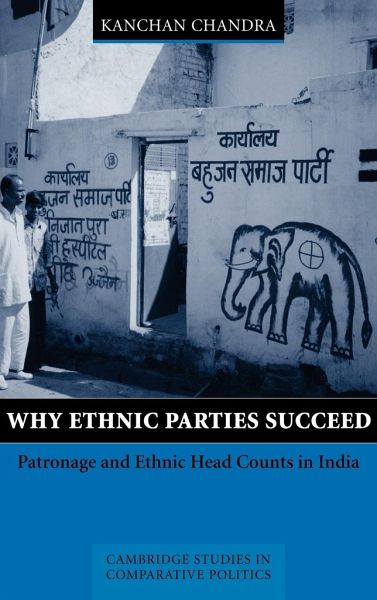
Why Ethnic Parties Succeed
Patronage and Ethnic Head Counts in India
Herausgeber: Lange, Peter; Bates, Robert H.
Versandkostenfrei!
Versandfertig in 1-2 Wochen
132,99 €
inkl. MwSt.
Weitere Ausgaben:

PAYBACK Punkte
66 °P sammeln!
Why do some ethnic parties succeed in attracting the support of their target ethnic group while others fail? In a world in which ethnic parties flourish in both established and emerging democracies alike, understanding the conditions under which such parties rise and fall is of critical importance to both political scientists and policy makers. Drawing on a study of variation in the performance of ethnic parties in India, this book builds a theory of ethnic party performance in 'patronage democracies'. Chandra shows why individual voters and political entrepreneurs in such democracies conditio...
Why do some ethnic parties succeed in attracting the support of their target ethnic group while others fail? In a world in which ethnic parties flourish in both established and emerging democracies alike, understanding the conditions under which such parties rise and fall is of critical importance to both political scientists and policy makers. Drawing on a study of variation in the performance of ethnic parties in India, this book builds a theory of ethnic party performance in 'patronage democracies'. Chandra shows why individual voters and political entrepreneurs in such democracies condition their strategies not on party ideologies or policy platforms, but on a headcount of co-ethnics and others across party personnel and among the electorate.
Table of contents:
1. Introduction; Part I. Theory: 2. Limited information and ethnic categorization; 3. Patronage-democracy, limited information, and ethnic favoritism; 4. Counting heads: why ethnic parties succeed in patronage-democracies; 5. Why parties have different headcounts; Part II. Data: 6. India as a patronage-democracy; 7. The Bahujan Samaj Party (BSP) and the scheduled castes (SCs); 8. Counting heads and party formation: why SC elites join the BSP; 9. Counting heads and preference formation: why SC voters prefer the BSP; 10. Counting heads and strategic voting: why SC voter preferences translate into BSP votes; 11. Explaining different headcounts in the BSP and congress; 12. Extending the argument to other ethnic parties in India: BJP, JMM, DMK; 13. Conclusion.
Why do some ethnic parties succeed in attracting the support of their target ethnic group while others fail? Drawing on a study of variation in the performance of four ethnic parties in India, this book builds a theory of ethnic party performance in 'patronage democracies'.
Offers a first theory on the performance of ethnic political parties as a distinct phenomenon.
Table of contents:
1. Introduction; Part I. Theory: 2. Limited information and ethnic categorization; 3. Patronage-democracy, limited information, and ethnic favoritism; 4. Counting heads: why ethnic parties succeed in patronage-democracies; 5. Why parties have different headcounts; Part II. Data: 6. India as a patronage-democracy; 7. The Bahujan Samaj Party (BSP) and the scheduled castes (SCs); 8. Counting heads and party formation: why SC elites join the BSP; 9. Counting heads and preference formation: why SC voters prefer the BSP; 10. Counting heads and strategic voting: why SC voter preferences translate into BSP votes; 11. Explaining different headcounts in the BSP and congress; 12. Extending the argument to other ethnic parties in India: BJP, JMM, DMK; 13. Conclusion.
Why do some ethnic parties succeed in attracting the support of their target ethnic group while others fail? Drawing on a study of variation in the performance of four ethnic parties in India, this book builds a theory of ethnic party performance in 'patronage democracies'.
Offers a first theory on the performance of ethnic political parties as a distinct phenomenon.














